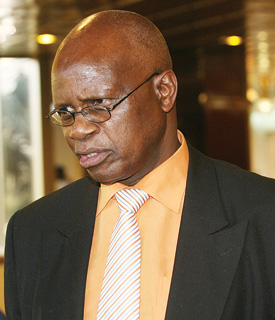
THE government allegedly recruited at least 10 000 workers within six months in defiance of its directive of freezing recruitment to contain the ballooning civil service wage bill.
BERNARD MPOFU STAFF REPORTER
According to documents in possession of NewsDay, the International Monetary Fund (IMF) has taken the government to task over the ballooning civil service wage bill after it emerged over 10 000 civil servants had been employed between March and September 2013 in defiance of a standing policy to freeze new jobs in the public service.
Last year, former Finance minister Tendai Biti last year accused the ministries of Defence and Home Affairs of unilaterally recruiting soldiers and police officers – effectively pushing government wage bill to as much as $190 million against a monthly income of slightly above $200 million.
Zimbabwe hosted an IMF mission between November 6-20 last year to review progress on the implementation of the Staff Monitored Programme (SMP) as well as discuss macroeconomic projections in preparation for the 2014 national budget, which was presented by Finance minister Patrick Chinamasa on December 19.
The SMP is critical in mapping out a way to tackle the country’s external debt estimated at over $6 billion.
The Brettonwoods institution also hinted on extending the SMP by at least three months to cater for delays caused by the electoral process in the country.
Zimbabwe held harmonised elections on July 31, marking an end to the inclusive government formed in 2009 after a disputed presidential run-off election in June 2008.
- Chamisa under fire over US$120K donation
- Mavhunga puts DeMbare into Chibuku quarterfinals
- Pension funds bet on Cabora Bassa oilfields
- Councils defy govt fire tender directive
Keep Reading
“The Fund (IMF) noted that the number of civil servants had increased by 10 000 between March 2013 and September 2013 and questioned the government’s commitment to the policy of a hiring freeze,” part of the document read.
“The government agreed to have the second SMP review mission in March 2014, which would be combined with the routine Article IV Consultation Mission.”
The fund said while the government projected the economy to grow by 6,1% this year, preliminary findings by the IMF, however, reflected a lower growth rate of 4,8% in 2014.
Official figures show that the public sector wage bill accounts for 75% of total revenue, crowding out capital projects. At the individual level, the civil service remuneration structure has remained modest, with monthly payments of under $316 at the entry levels.
Professionals in education, health and administration were being remunerated at monthly average levels of around $465.
The IMF also noted that revenues for 2013 were boosted by the renewal of operating licences by telecommunication operators, as well as the upward review of excise duty on petrol and diesel during the run up to the harmonised elections.
“The IMF and Reserve Bank of Zimbabwe agreed that errors and ommissions remained sizeable and growing, which was a cause for concern. Initial possible sources of these errors were under-reporting of remittances, FDI (foreign direct investment) and exports. The mission suggested that the size of the private remittances that come through the informal channels can only be estimated through a study or survey,” the report read.
Presenting the 2014 national budget last month, Chinamasa said Treasury was working on cutting the public sector wage bill by growing the revenue base.
“. . . It is, therefore, critical that we grow the economy, to allow us to do more meaningful review of the public service remuneration structure, while at the same time creating additional budgetary resources for social expenditures and growth enhancing infrastructural expenditures,” Chinamasa said.
“Pursuant to this, as we implement the Zimbabwe Agenda for Sustainable Socio-Economic Transformation priority programmes, the government will be operating on a gradual budget wage bill reduction strategy. This should see us reduce the wage bill from the prevailing absorption of 75% of the budget in 2013 to 55-65% by 2015, further reducing to 30% by 2018.”










